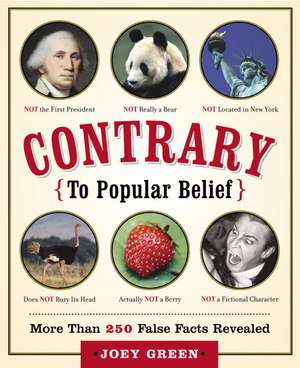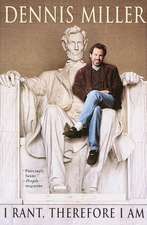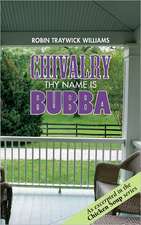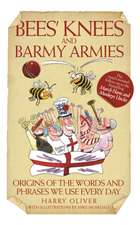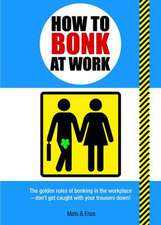Contrary to Popular Belief: More Than 250 False Facts Revealed
Autor Joey Greenen Limba Engleză Paperback – 30 sep 2005
Inside you’ll learn:
George Washington was not the first president of the United States.
Leap year does not occur every four years.
The ostrich does not bury its head in the sand.
Thomas Edison did not invent the light bulb.
Ship captains cannot perform marriages at sea.
Sound does not travel at the speed of sound.
The needle on a compass does not point to the North Pole.
Leonardo da Vinci did not paint the Mona Lisa.
And more than two hundred other bits of conventional “wisdom” that are completely bunk.
Preț: 102.89 lei
Nou
Puncte Express: 154
Preț estimativ în valută:
19.70€ • 20.26$ • 16.34£
19.70€ • 20.26$ • 16.34£
Carte disponibilă
Livrare economică 29 ianuarie-12 februarie
Preluare comenzi: 021 569.72.76
Specificații
ISBN-13: 9780767919920
ISBN-10: 0767919920
Pagini: 260
Ilustrații: OVER 150 BLACK & WHITE ILLUSTRATIONS THROUGHOUT
Dimensiuni: 141 x 172 x 18 mm
Greutate: 0.3 kg
Editura: BROADWAY BOOKS
ISBN-10: 0767919920
Pagini: 260
Ilustrații: OVER 150 BLACK & WHITE ILLUSTRATIONS THROUGHOUT
Dimensiuni: 141 x 172 x 18 mm
Greutate: 0.3 kg
Editura: BROADWAY BOOKS
Notă biografică
JOEY GREEN is the bestselling author of more than thirty books, including Clean Your Clothes with Cheez Whiz and Joey Green’s Magic Brands, which together have sold more than one million copies. Among countless other shows, he has appeared on The Tonight Show with Jay Leno, The View, and Good Morning America.
Extras
George Washington was the ninth president of the United States.
The United States was established on July 4, 1776. George Wash-ington was inaugurated president thirteen years later, on April 30, 1789. During the intervening years, the Second Continental Congress in Philadelphia drew up the Articles of Confederation (the first American constitution). In 1781, Maryland representative John Hanson was elected the first president of the Congress of the Confederation. His official title was "president of the United States in Congress Assembled." After Hanson, seven other men served as president: Elias Boudinot, Thomas Mifflin, Richard Henry Lee, John Hancock, Nathaniel Gorham, Arthur St. Clair, and Cyrus Griffin. In 1787, Congress held a constitutional convention. The delegates wrote the current constitution, ratified by the states in 1788. The following year, the ratifying states elected Washington our nation's ninth president (but the first president under the new constitution).
The song "As Time Goes By" was not written for the movie Casablanca.
"As Time Goes By" (music by Herman Hupfeld, lyrics by Irving Kahal) was originally sung in the 1931 Broadway stage show Everybody's Welcome, and Rudy Vallee recorded the song later that year. Casablanca premiered eleven years later in 1942. The popularity of the movie prompted RCA to rerelease the Rudy Vallee recording.
The Black Hills of South Dakota are not hills.
Hills rise less than 1,000 feet from the surrounding area, while mountains rise above that height. The Black Hills rise from 2,000 to 4,000 feet above the surrounding area. Several peaks exceed 6,000 feet, and the highest "hill," Harney Peak, reaches 7,242 feet, higher than any peak in the Appalachian or Ozark mountains. The Sioux Indians named the mountains Paha Sapa ("hills of black") because from the plains, the pine trees covering the mountains appear black (and because the Sioux had no idea geologists strictly distinguished between hills and mountains).
The Earl of Sandwich did not invent the sandwich.
History's first recorded sandwich is the Hillel sandwich, invented by Rabbi Hillel between 70 B.C.E. and 10 C.E. The sandwich, eaten during Passover seders, consists of charosets (a combination of fruits, nuts, and honey) and bitter herbs between two pieces of matzah (Hebrew for "unleavened bread"). As early as the Middle Ages, Arabs have eaten meat stuffed inside a pocket of pita bread, and medieval European peasants ate bread and cheese lunches in the fields. John Montagu, the fourth Earl of Sandwich (1718-1792), did eat sliced meats and cheeses between two pieces of bread to keep one hand free while playing cards at the gambling table, giving the sandwich its name, but not its origin.
The tuxedo did not originate in England.
In the summer of 1886, Pierre Lorillard IV, living in Tuxedo Park, a small hamlet in Westchester County, New York, did not want to wear formal black tie and tails to the annual Autumn Ball at his country club. He commissioned a tailor to make several semiformal tailless black jackets--in the style of the scarlet riding jackets popular with British fox hunters. Black tie and tails originated in England in the early 1800s. Lorillard may have been inspired by Edward VII, who during a visit to India as Prince of Wales had ordered the tails cut off his coat to keep cool in the heat. Ultimately, Lorillard did not wear the new dinner jacket to the ball, but his son, Griswold, and some of Griswold's friends, did--starting a trend. The jacket became known as the tuxedo, after the town, which was named after Algonquin Indian chief P'tauk-Seet (the P is silent), meaning "wolf."
Congress did not sign the Declaration of Independence on July 4, 1776.
On July 4, 1776, the Second Continental Congress, meeting in Philadelphia at the Pennsylvania State House, formally adopted the final draft of the Declaration of Independence. Only John Hancock, as president of Congress, and Charles Thomson, congressional secretary, signed it. The State of New York did not vote on it until July 9. On July 15, Congress ordered that the declaration be written on parchment, and on August 2, fifty assembled delegates signed the final document. Six others signed the document on later dates, including some who were not members of Congress when the declaration was adopted and Thomas McKean, who signed his name five years later, in 1781.
The Battle of Waterloo was not fought at Waterloo.
In June 1815, Britain's Duke of Wellington led troops against Napoleon and his troops in a small valley four miles to the south of Waterloo in Belgium between the villages of Plancenoit and Mont St. Jean. The battle became known as Waterloo possibly because Wellington slept in Waterloo the night before, or because after the victory, he returned to Waterloo to write home with the news.
Camels do not carry water in their humps.
Camels do not have a reservoir for liquids in their hump. The hump is a food reserve made primarily of fat. By storing most of its body fat in the hump, the camel can lose heat freely from the rest of its body without having to perspire much, thereby conserving water. A camel can go for days or even months without water because, unlike other animals, camels retain urea and do not start sweating until their body temperatures reach 115 degrees Fahrenheit.
The most abused drug is not alcohol.
The most abused drug in the world is caffeine--found in sodas, coffee, tea, cocoa, chocolate candies, and many over-the-counter medicines. According to the National Institute on Drug Abuse, caffeine is an addictive drug that creates physical dependence and causes an increase in heart rate, body temperature, urine production, and gastric juice secretion. Caffeine can also raise blood sugar levels and cause tremors, loss of coordination, decreased appetite, and postponement of fatigue, and it can interfere with the depth of sleep and the amount of dream sleep.
Paul Revere did not single-handedly make a midnight ride to warn American colonists that the British were coming.
Paul Revere was one of three riders on the famous midnight ride of April 18, 1775, from Boston to Concord, Massachusetts. The other two were William Dawes and Samuel Prescott. In the poem "Paul Revere's Ride" by Henry Wadsworth Longfellow, only Revere rides to Concord, after seeing one lantern light in the steeple of the Old North Church. In reality, the signal was not sent to Revere. He had directed that the signal be sent to friends in Charlestown. The "midnight ride" began at 1 a.m., and along the way Revere, Dawes, and Prescott ran into a British cavalry patrol. Dawes and Prescott escaped, but Revere was captured, detained, and forced to walk back to Lexington without his horse. Dawes also returned to Lexington. Only Prescott made it to Concord.
The potato did not originate in Ireland.
As early as 200 C.E., the Incas cultivated the potato in the Andes Mountains in what is now Peru and Bolivia. In the sixteenth century, Spanish conquistadors brought the potato to Europe. Soon after, English explorers brought potatoes to England. From there, potatoes were introduced to Ireland, where Irish farmers began growing them. The horrors of the Irish potato famine of the late 1840s, during which some 750,000 Irish people starved to death, cause people to wrongly conclude that the potato originated in Ireland. A statue of Sir Francis Drake in Offenbach, Germany, wrongly proclaims the English explorer as "Introducer of the Potato into Europe." There is no evidence that Drake, who sailed around South America, carried potatoes aboard his ship, the Pelican.
The Earth is not a sphere.
The Earth, flattened at the poles and bulging at the equator, is actually an oblate spheroid. In other words, the distance around the Earth along the equator (24,901.55 miles) is greater than the distance around the Earth through the North and South poles (24,859.82 miles). According to Sir Isaac Newton, this bulge is caused by the rotating Earth's centrifugal force.
Maine is not the easternmost state in the United States.
Alaska is not only the westernmost state, but also the easternmost state. Some of Alaska's Aleutian Islands (the Rat Islands and the Near Islands) lie west of the 180th meridian, the dividing line between the Eastern Hemisphere and the Western Hemisphere, placing them securely in the Eastern Hemisphere.
Chess did not originate in Russia.
Chess began in sixth-century India as a game called chaturanga ("army" in Sanskrit) using miniature chariots, cavalry, infantry, and elephants as playing pieces. The game spread to Persia, which was conquered by the Arabs in the seventh century. Arab invaders brought the game to Spain in the tenth century, where it spread throughout Europe. The Europeans gradually changed the playing pieces to bishops, knights, pawns, and rooks. The Arabs had renamed the game al-schah-mat ("the king is dead" in Arabic), which in English became the word checkmate. In Russia, chess is called schahkmat. The English word chess comes from the Persian word shah, meaning "king." People think chess originated in Russia because Russians held the official world chess championship title from 1948 until 1972, when American Bobby Fisher beat Boris Spassky. The Russians regained the title in 1975 and held it through 2004.
Jesus was not born on December 25, 1 a.d.
Nobody knows when Jesus when born. The New Testament does not specify the date. In the third century C.E., church father Clement of Alexandria suggested May 20, since the New Testament states that the shepherds who were told by an angel of Jesus's birth were watching their flocks during the night (Luke 2:9), which was done only in the spring at lambing time. In 336 C.E., the Western Church decided to celebrate December 25 as Jesus's birthday (officially adopted by Bishop Liberius of Rome in 354 C.E.), to usurp the popular Roman pagan feast of Natalis Solis Invicti ("birthday of the unconquerable sun"), honoring the Persian sun god Mithras. For centuries, pagans had celebrated the death and resurrection of the sun on the winter solstice in late December, and around 274 C.E., Roman emperor Aurelian had proclaimed Mithraism the official state religion.
The Eastern Orthodox Church and the Ukrainian Catholic Church still follow the Julian calendar, established by Julius Caesar in 45 B.C.E., celebrating Jesus's birthday on January 6.
In the sixth century c.e., a monk, Dionysius Exiguus, began counting the years from the year of Jesus's birth, which he miscalculated to be four to eight years later than the actual date. Since Jesus was born during the lifetime of Herod the Great, his birth had to take place before Herod's death in 4 b.c.e. The New Testament states that Caesar Augustus ordered a census, compelling Joseph to bring his pregnant wife, Mary, to Bethlehem. Ancient documents seem to indicate that a census took place between 6 and 8 B.C.E.
So, while most Christians celebrate the birth of Jesus on December 25, Jesus was more likely born in the spring--sometime between 4 and 8 B.C.E.
Ferdinand Magellan was not the first explorer to sail around the world.
Magellan, a Portuguese seaman whose real name was Fern‹o de Magalh‹es, led an expedition of five ships from Spain in 1519, navigated what would become known as the Strait of Magellan at the southern tip of South America, became the first European to sail the Pacific, and discovered Guam and the Philippines, where the indigenous people killed him on the island of Mactan in 1521. One of Magellan's officers, Juan Sebastian del Cano, led one ship back to Spain in 1522, completing the first circumnavigation of the world. The first explorer to sail around the world was Sir Francis Drake.
The seventeeth president of the United States was not Ulysses S. Grant.
His parents named him Hiram Ulysses Grant, but they called him Ulysses. In 1839, the congressman who appointed Ulysses to the U.S. Military Academy at West Point mistakenly reported the youth's name to the registrar as Ulysses S. Grant. He thought Ulysses was the young man's first name and his middle name that of his mother's family, Simpson. Grant, convinced that his classmates might tease him over his real initials (H.U.G.), never corrected the mistake.
Benjamin Franklin did not found the Saturday Evening Post.
In 1899, editor George Horace Lorimer started running the phrase "Founded A.D. 1728 by Benjamin Franklin" on the cover of the Saturday Evening Post to sell more magazines. The Saturday Evening Post actually had been founded in 1821, thirty-one years after Benjamin Franklin's death. In 1729, Franklin did buy and operate the Pennsylvania Gazette, a small newspaper that continued publishing after his death in 1790, finally going defunct in 1815, six years before the first issue of the Saturday Evening Post hit the press--in the same print shop where the Pennsylvania Gazette had been printed.
James Watt did not invent the steam engine.
In 1698, Thomas Savery patented the first practical steam engine, a pump used to drain flooded mines in Cornwall, England. Steam entered a sealed vessel through a hand-operated valve, cold water was poured on the vessel to condense the steam inside and create a partial vacuum, then the valve was opened so the vacuum could suck water up a pipe and into the vessel. In 1712, English blacksmith Thomas Newcomen invented a steam engine that powered a piston. In 1763, Scottish engineer James Watt improved on a Newcomen engine by introducing the idea of two separate chambers for vaporization and condensation, rather than one chamber, which wasted enormous amounts of steam. He received a patent for his innovation in 1769, but to say that Watt invented the steam engine is nothing but a lot of hot air.
Adolf Hitler did not paint houses or hang wallpaper.
After failing the entrance examination to the Academy of Fine Arts in Vienna, Austria, two years in a row, Adolf Hitler supported himself by making posters for shopkeepers and by painting picture postcards that he peddled in taverns. He did take odd jobs shoveling snow, carrying suitcases at the Vienna train station, and as a day laborer on construction projects, but he never made a living painting houses or hanging wallpaper. However, on October 4, 1939, one month after Hitler invaded Poland, the French weekly Marianne published on its front page a satirical photo montage--created by Danish photographer Jacob "Marinus" Kjeldgaard--depicting Hitler as a housepainter. Soon afterward, the French air-dropped 200,000 postcards of the image over Germany. The image also appeared in an estimated 140 American newspapers and magazines.
The world's largest pyramid is not in Egypt.
The Quetzalc—atl, the largest pyramid in the world, sits in Cholula de Rivadabia, sixty-three miles southeast of Mexico City. Built between the second and sixth centuries C.E. and dedicated to the Aztec god Quetzalcóatl, the pyramid rises 177 feet and covers nearly 45 acres. By comparison, Egypt's Great Pyramid of Cheops, built in the third millennium B.C.E., rises just 130 feet and covers less than 13 acres--but clearly gets much better publicity.
The song "Yankee Doodle" was not written by American colonists during the Revolutionary War.
Most historians believe that a dapper British soldier, Dr. Richard Shuckburg, wrote the song in 1755 during the French and Indian Wars, to ridicule American colonial militiamen's motley clothes, outdated equipment, and lack of military training. A Yankee Doodle is a ragamuffin country bumpkin from New England who sticks a feather in his cap to be stylish, but actually looks ridiculous. British soldiers sang the ditty to demoralize the colonists as they marched to the Battle of Concord. When the colonists won the battle, they sang the derisive song as their own defiant patriotic cheer. So stick a feather in that!
Descriere
Revealing 250 "false facts"--a bit of knowledge that the world believes to be true--Green unburdens the world of all kinds of misinformation with the truth about history, entertainment, science, religion, and more.
